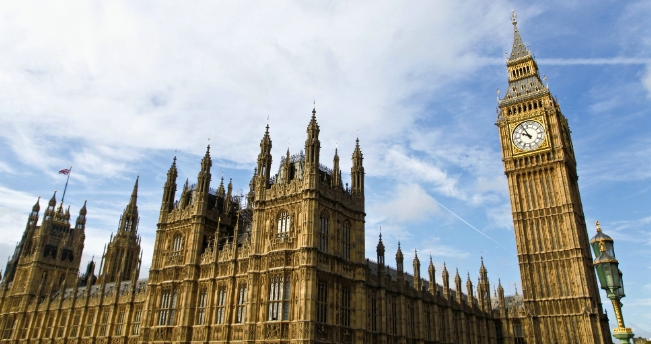Polls, policies, Brexit and your finances: what to expect in the run up to 8th June
November 2016 brought us the election of President Trump. Earlier this month, Emmanuel Macron became President of France. Apparently not wanting to be left out, Theresa May took to the Downing Street lectern reserved for important announcements and called for a UK General Election to be held on Thursday June 8th.
Citing political divisions in Westminster as her reasoning, Mrs May’s decision appears to have equal amounts to do with crystallising her party’s current lead over Labour into a greater majority in Parliament and her need for a greater mandate in order to progress with her desired direction on Brexit, amongst other matters. As the Prime Minister rightly said when she came back from Buckingham Palace after the formal dissolution of Parliament, there are only two people who can possibly be the Prime Minister after June 8th – herself or Jeremy Corbyn – and current polls put May well ahead.
Assuming everything goes to the Conservative’s plan then now appears to be the perfect time for them to secure a greater majority in Westminster and mandates for both May herself and her position on Brexit. General Elections though, are notoriously tricky things – especially given the current global climate when it comes to politics. What might we see over the next month or so and what impact will the outcome have on the economic and political landscape?
The Opinion Polls
At the moment the opinion polls indicate that the strategy is working. The ICM Research poll conducted on 5th to 7th May put the Conservatives on 49% (up two points on ICM’s previous poll), Labour down 1% to 27%, the Liberal Democrats on 9%, UKIP on 6% and the Greens on 3%.
These numbers line up with the result of the local elections on May 4th, which brought an overwhelming win for the Conservatives, who gained 563 seats while Labour lost 382. The much-heralded Liberal Democrat revival completely failed to happen as they lost 42 seats. UKIP were wiped out: under new leader Paul Nuttall they lost 145 seats to be left with just one seat in the whole of the UK. Brexit may have divided Britain but it has re-united the right, and it has re-united it under the banner of Theresa May.
The Prime Minister may be right to downplay these results, saying that the only poll which matters is the one on June 8th, but it is almost impossible to see any result other than a Conservative majority. Certainly the weekend newspapers were in no doubt: May on course for landslide was a typical headline.
The number crunchers at Sky were rather more circumspect, suggesting that the local election results would translate into a majority of just 48. The bookmakers are currently expecting the Conservatives to win between 380 and 400 seats: with a total of 650 seats in parliament, the lower figure would translate into an overall majority of 110. The simple fact is that whichever figure you take, short of a dramatic turnaround it will be Theresa May standing once again at the lectern outside 10 Downing Street on June 9th, with her own mandate to push through both Brexit and the policy changes she favours.
How will the new government – and President Macron – affect Brexit?
Clearly a win for the Conservatives on June 8th means that Brexit will happen: not only will Theresa May have a clear majority, a great many of the new intake of backbench MPs will be people who actively campaigned for ‘Leave’ during the Referendum.
Equally clearly though, we have a new President in France. What can we expect from Emmanuel Macron, and what will his move into the Elysee Palace mean for Brexit?
Macron’s victory (with 66% of the votes cast) was greeted with sighs of relief across Europe and the euro duly strengthened on the result. But Macron faces huge challenges – the French unemployment rate still hovers at around 10%, for example, and he has promised much.
He plans a big reduction in public spending and a relaxation of labour laws, alongside more investment in training: he’ll also need to tackle France’s unwieldy (and expensive) pension system. But any thoughts of a brave new dawn and a country united behind a new leader need to be tempered by the abstention rate on Sunday – around 25% – and the record number of spoiled ballot papers submitted by more than 11% of those who did vote. Many of those who did not vote will have been supporters of the far-left Jean-Luc Melenchon, whose high-spending, anti-EU platform had many similarities with Marine Le Pen’s message.
How will Macron’s win affect Brexit? The short answer is that we don’t know. Interviewed on Radio 4 on Monday morning, Jean Pisani-Ferry, economic adviser to Macron, said that the new President “would not seek to punish” Britain as both sides would benefit from maintaining economic ties. Other commentators have been less optimistic, arguing that Macron has already said that he considers the UK’s decision to leave a “serious mistake” and that – far from taking back control – the UK had signed up to a subordinate status, putting it “on a par with Guernsey.”
In the short term, the Brexit negotiations are going to bring plenty of words and posturing and precious little action. We have already had wildly differing versions of the recent discussion over dinner between Theresa May, David Davies, Jean-Claude Juncker and the EU’s chief Brexit negotiator Michel Barnier.
All of these spats make for great headlines: the simple fact is that there will be no substantive negotiations before the result of the General Election is known – and you would have to wonder how much can be achieved before the summer holidays and then the German elections in mid-September.
What are we likely to see between now and Polling Day?
It may be a good time to book a short break: ‘more of the same’ is the simple answer. Expect more soundbites, more carefully stage-managed appearances (especially from the Prime Minister) and endless repetition of the ‘strong and stable’ and ‘for the many, not the few’ mantras. With the election debates to look forward to, holiday booking websites should probably prepare for extra traffic…
The Conservatives would almost certainly like to bring the election forward to tomorrow. With a month to go there is plenty of opportunity for gaffes and slip-ups and the Prime Minister may have made one with her pledge to cap household energy bills. This has been roundly criticised on all sides, with many commentators saying that it will discourage people from switching suppliers and therefore reduce competition. Other experts suggest that the energy suppliers will simply push their lower tier prices up to the cap, and hit the people Theresa May is supposedly determined to help – those that are ‘just about managing.’
What can we expect to see from a Theresa May government?
As we have written above, Brexit is going to happen. Theresa May has repeatedly said that “no deal is better than a bad deal”, laying out a bullish position in the run up to formal negotiations. However, the most likely outcome is still that some form of compromise is reached between all parties over the next eighteen months or so. Should a deal not be negotiated then the UK would leave the EU without a trade agreement and – until one is negotiated – conduct its trade with Europe under World Trade Organisation rules.
At home, we may well see a shake-up in UK pensions regulations. Mrs May has already pledged to protect company schemes against ‘unscrupulous bosses’ and there is also likely to be an end to the ‘triple lock’ on pensions. The fact remains, though, that people in the UK do not save enough for their retirement: do not be surprised to see mandatory increases in pensions contributions for both employers and employees.
We will also see more government investment in the economy, with Philip Hammond – who will probably stay as Chancellor if the commentators are to be believed – already congratulating himself on the impact his first raft of investment has had on the growth forecasts for the UK.
There will unquestionably be further crackdowns on ‘middle class tax perks’ and tax avoidance schemes. Theresa May and Philip Hammond both seem to have an obsession with ‘playing by the rules’, but this may simply be tinkering at the edges. It will take more than a crackdown on gym memberships if the Chancellor is to seriously reduce government borrowing and clear the deficit.
The electoral map of the UK will be re-drawn: there will be fewer MPs and the over-representation of Scotland at Westminster will be scaled back. The Prime Minister will not be doing this to anyone’s advantage but her own, making it significantly more difficult for the other parties to stage a revival.
Will we see a second independence referendum in Scotland – the so-called ‘neverendum’? At the moment the SNP look to be on course to lose seats in the General Election which will weaken their bargaining position. It may be that they will need to turn their attentions to more pressing domestic problems such as health and education before they are in a position to demand a second bite at the independence cherry.
What will all this mean for my savings and investments?
Theresa May called the General Election last month, just as the International Monetary Fund upgraded its growth forecast for the UK, lifting it to 2% for the year from the 1.5% it had forecast in January. This is the biggest upgrade it has given to any economy and would see the UK growing faster this year than all the other G7 economies, with the exception of the US. Growth is currently expected to slow to 1.5% in 2018 as inflation slows consumer spending, but this would still see the UK growing at the same rate as Germany.
Clearly the great unknown in this is Brexit: the vast majority of the dire, pre-Referendum, economic predictions have not come to pass. However, it is early days and President Macron will undoubtedly try and tempt some of London’s financial markets and jobs across the channel.
The FTSE 100 index of leading shares started the year at 7,143: at the time of writing, it stands at 7,340 – up 2.7% for the year. In the USA, the Dow Jones index has gone through the 21,000 barrier, having started the year at 19,763: the German and French markets are also up for the year as a whole. So far, so good – but there will be bumps along the way and undoubtedly there will be days when the Brexit negotiations appear to be holed beneath the waterline.
As always, there will be good and bad news and – as Harold Macmillan famously said – “events, dear boy, events”. Whatever those events are we will be here to interpret them for you and to answer your questions: remember that we are never more than a phone call or an email away.


